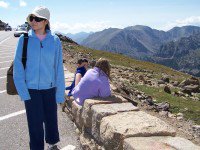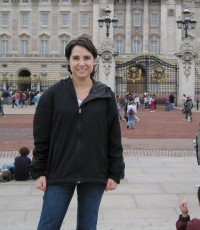Erythropoietic Protoporphyria (EPP)

I am a 38-year-old mother of two who lives right outside of Philadelphia. I was diagnosed with EPP at the age of two. My mother had noticed that I would get scabs on my nose when she took me out in the sun, so she took me to our family doctor who thought I had porphyria. Since this wasn't something anyone in our family had she got a second opinion at Children's Hospital of Philadelphia where they confirmed, through testing, that I did indeed have Erythropoietic Protoporphyria (EPP).
I have had outbreaks every year since then, though some years are better than others. My hands, nose and feet are the most affected. My symptoms are itching, burning, swelling, tingling, pain, sensitivity to different temperatures. Depending on the severity of the outbreak, my symptoms last from a day to a week. I limit my sun exposure to no more than an hour in full sun and about two hours covered up. I use tons of sunscreen and protective clothing (which I discovered only a few years ago).
I find most doctors do not know much about EPP. They make notations in my file but don't ask many questions about it. A good example would be that I took birth control pills for five years and just learned recently that I should not have taken them at all. I do wish I had learned that from one of my doctors. I find that European doctors seem to have a better understanding of my symptoms and how the disease works. I used to see a dermatologist for my outbreaks and when I was little I was tested periodically. There was never any information for me out there so I just tried to figure out my limits on my own and stopped seeing a doctor about the disease.*

When I became pregnant with my first child my husband and I spoke with genetic counselors at our hospital. They Maria, all covered up in Colorado decided that we should test the baby right after birth to determine if he/she would have EPP. When my daughter was born we had her tested and she tested positive for it. When my son was born, he too tested positive for it. The doctors recommended that we retest them after they were two, as the tests they had as newborns could be a false positive.
My children are now 10 and seven and show no symptoms of EPP. A few years ago I had my son retested while he was having his normal checkup and his levels seemed to be a bit higher. At the recommendation of our pediatrician I consulted with the Chief of Hematology at duPont Children's Hospital in Delaware. The doctor contacted Dr. Micheline Mathews-Roth who indicated that my son could be a carrier but we could only know for sure with genetic testing. At this point, my husband and I decided that we would forgo it and let my son decide if he wanted it when he got older to determine whether or not his children may inherit EPP. I have no idea what my daughter's levels are, but will leave the genetic testing up to her if she wants it when she's older. My two sisters have been tested—they never showed any symptoms of EPP, and neither one is a carrier.
Through the testing process for my son, the doctor wanted me to get retested and so I did. The process of finding a lab that knew what was required was challenging as not all labs are equipped for doing the testing. It was reconfirmed that I had EPP but the doctor gave me all my results so I was able to see what my levels are, he also explained the genetic process and helped me really understand how it all happens. It is very lonely out there when you can't find any information on your illness or someone to relate to. A few years back I did a web search and found the APF website. What a thrill to find more information on my illness. I have been able to better understand my disease and educate my doctors on various parts of it. My family doctor has all the info I can find on EPP and is more than happy to make sure I have all my tests done for liver function, etc.
It's not easy living with EPP. My family has always made sacrifices to help me stay symptom-free. The outbreaks can make me delirious with pain and there isn't anything I can take for it. I try to keep my symptoms to myself but there are times when the pain is so great that I lose my temper and my patience. There have been many nights that I have had a bucket of cold water by my bed so I wouldn't have to get up to cool my hands or feet.

I try to stay out of the sun as much as possible but things like sun exposure through the car windows when I am driving can aggravate EPP. I now use gloves while driving in the spring and summer and a sun-protective scarf when I am a passenger. When I was younger I thought the hardest part was missing out on all the fun stuff myself, but after having kids I find that they have had to adapt to my limitations too and at times that makes me very sad. When they were babies and I had an outbreak, changing a diaper was a huge and very painful task and holding them was no better.
As my children got older and wanted to play outside they would protest when I would say "Mommy can't be out in the sun." Now they understand better and go with the flow of things, though at times I do need to remind them why we have to move inside. If anything I hope that I've instilled a sense of them taking care of their skin when they are going to be out in the sun. I also hope that the EPP stops with me and that their lifestyles will not be hindered once they have their own children.
*Editor's note. With more than 6,000 rare diseases in the world, the unfortunate fact is as Maria says: it is simply not possible for any doctor to be well versed in all of them. This means rare disease patients must rely on a combination of educating themselves and their doctors from reliable sources of medical information, and looking to expert consultation when it is available. The APF exists to provide all of these resources to patients and families dealing with all types porphyria. Please call our office to let us know how we can help you.